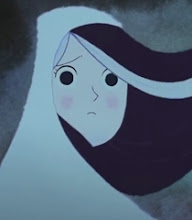My first name is an old-fashioned French name. When I was born my parents had not decided on a name, and asked the family doctor to choose one. "Noisette" he said without hesitation (or something very close to that, anyway). As a result of this one carefree act, all of my life I've been conscious of names and their connotations.
Yesterday I met a man who up until that point I had only talked to on the phone. "Noisette" he said, "You're not at all what I expected" and he made a mysterious gesture above his head as if outlining a large bow or elegant pompadour. I've been musing over that gesture and what it could possibly mean.
I think it can only mean this...
























